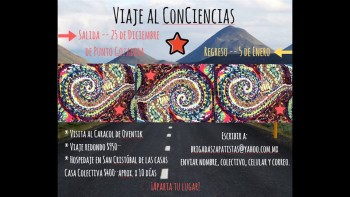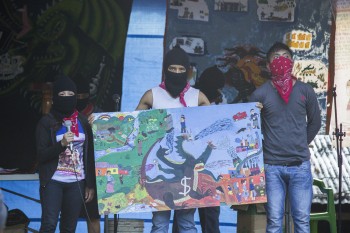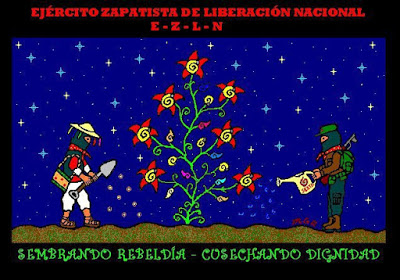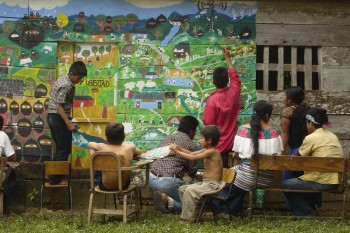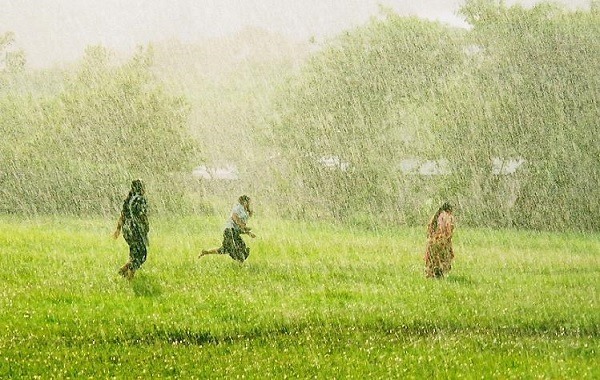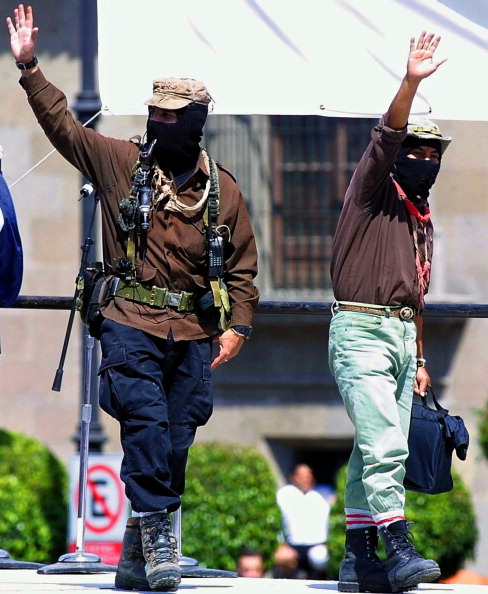
Foto: JORGE UZON/AFP/Getty Images
One House, Other Worlds
July/August/September, 2016
To whom it may concern:
Subject: Invitation to “CompArte and ConCiencias for Humanity.”
Yes, we know. Days and nights go by in which bitterness is the only thing that appears on the horizon. Our steps drag along in pain, rage, and indignation, stumbling every so often over the impertinent gaze of cynicism and our own disappointment; over the stupidity exalted in government positions and polls; over simulation as a way of life; over the substitution of frivolity for culture, art, and science; over the multiple tiers of disrespect for the different (the problem isn’t that the other exists, but that it shows itself”); and over a wholesale resignation in the political market sphere (“oh well, the only option left is to choose not the lesser evil, but the least scandalous”). Yes, things are hard, harder every day. It is as if the night has become longer. It is as if the day has postponed its stride until no one and nothing is left, until the path is empty. It is as if there was no breath left. The monster lies in wait in every corner, countryside, and city street.
Despite all this, or precisely because of it, we send you this invitation.
It may seem that it is not the moment nor the matter at hand, but we Zapatistas invite you to participate in the festivals “CompArte and ConCiencias for Humanity.” So, respecting etiquette, we have to send an invitation. This should be something that details a calendar and a geography, because we know that you have your own path, your own pace, your own company on that path, and your own destiny. And we don’t want to add another difficulty to those that you already confront. Thus, an invitation must include the when and where.
But you know who we are. You know how we are, that is. And the question that we think an invitation must address is not the when and where, but rather the why. Perhaps that is why this invitation does not comply with the etiquette of the occasion and does not arrive on time, but rather too late or too early. But as you’ll see, it doesn’t matter. That is why this invitation is very other, and why it includes as a crucial element this little story:
One House, Other Worlds
It’s more of a legend than a story. That is, there’s no way to confirm the truthfulness of what is told here. This is partly because it details no specific calendar or geography; it could have happened, or not, in any undefined time or place. It is also because the supposed non-protagonist of this story is dead, deceased, done, defunct. If he was alive, we could just ask if he actually said what it says here that he said. And as he was always tenacious in his wanderings through the tree tops, it is likely that he would go on at length to describe this imprecise calendar.
In any case, since we don’t have the exact date, we’ll just say it was more than two decades ago. The geography? The mountains of the Mexican Southeast.
It was Comandante Tacho who told us the story in the wee hours of the morning at the EZLN headquarters. He was describing the house of the system, the home of capital, the storm, and the ark. We were in our headquarters, the headquarters where what would later become the seedbed/seminar was born. We think we took a coffee break… or that we adjourned the meeting in order to continue the next day… to tell you the truth, we don’t really remember. The point is that we were talking to Tacho and it was he who told us what we’re going to tell you now. There is of course a little bit of finagling involved because we have added to and rearranged Tacho’s original words. We did this not out of bad faith, disrespect, or an attempt to mend faulty memories, but because both of us who are writing now knew the deceased quite well and can reconstruct his words and feelings. Here goes:
This is Comandante Tacho speaking:
“I don’t remember very well when it was, but it was when the deceased Sup was not yet deceased. He was just the Sup, staying up all night and smoking his pipe. Yes, chewing on the pipe, as usual. We were in the shelter that was the EZLN headquarters, although it wasn’t a shelter because it wasn’t finished yet. That is, it wasn’t EZLN headquarters yet. Perhaps it was going to be, but not yet.
We were telling funny stories, things that happened in the communities, in the meetings, in the work of the struggle. The Sup was just listening, sometimes laughing, sometimes asking more about what happened. Before I really knew him I didn’t understand why. Later I realized that these accounts would appear later as stories in the communiques. I think he called them ‘postscripts.’ I asked him once why he called an account of what had really happened just a story. He said, ‘The thing is that they don’t believe the accounts, they think I am making things up or imagining things. So I write it like it’s a story because they are not ready to see the reality.’
Anyway, so there we were.
So then he asked the Sup…”
Yes, Tacho has used the third person singular: “he.” In order to clarify we asked him if by “he” he meant the Sup. “No,” he answered us, annoyed, “he asked the Sup.” We didn’t want to insist because we thought, perhaps mistakenly, that that wasn’t the point of the story, or that it was merely one piece of a puzzle still being sketched out. So Comandante Tacho used the word “he.” Not “she,” not “I,” not “we.” He said “he” in referring to the person who was questioning the Sup.
“Hey Sup, how come every time we are building a house, you ask if we are building it according to traditional custom or by scientific method?”
Here Tacho took the time to clarify:
“Every time that we built a house, the deceased SupMarcos would come and stare at the beams and rafters. Then he would always ask:
‘That crossbeam that you’re putting there, are you putting it there because it is necessary for the construction of the house?’ Then I would respond, ‘Yes, if you don’t put it there the roof will fall in.’
‘I see,’ the Sup said, ‘but how do you know that if you don’t put it there that the roof will fall in?’
I just looked at him because I knew that wasn’t the real question. It wasn’t the first time he had asked it. He continued, ‘do you put it there because you know scientifically that if you don’t the roof will fall in, or do you put it there because it is traditional custom to do so?’
‘Because it’s traditional custom,’ I answered him, ‘because that is how I was taught. That is how my father built houses, and he learned from my grandfather, and so on going way back.’ The Sup was not satisfied, and always ended up climbing up onto the central beam before the supports were finished and, balancing as if he were riding a horse, would ask, ‘so if I get up here, is the beam going to fall?’ And boom, he would fall. ‘Ouch!’ was the only thing he’d say. He’d take out his pipe from where he landed on the ground, light it, and with his head resting on the broken beam, gaze up at the roof. We would all laugh of course.
So that’s why he asked the Sup why the Sup was always asking about whether something was done by traditional custom or scientific method. The thing is that it wasn’t just that one time. Every time that our headquarters had to be moved and I had to oversee the construction of a new structure for the headquarters, that is what happened. The Sup would come, he would ask that question, I would respond, he wouldn’t be satisfied, he would climb up on the beam, it would break, and he would fall to the ground.”
(Note: in discussing this between the two of us, we have concluded that the approximate dates for what Tacho is recounting were the first months of 1995 when there was such heavy governmental persecution against us that we had to continually pick up and move our headquarters, accompanying the community of Guadalupe Tepeyac in exile. End of note and Tacho continues):
“I am telling you this so that you understand why he asked the Sup this question. At other times I had also asked him this question, but he hadn’t responded fully. It wasn’t that he hadn’t wanted to respond, but that always at that moment they called him on the radio, or someone came to talk to him. So I wanted to know the answer too.
The Sup took his pipe out of his mouth and put it to one side. We were sitting on the ground. It was very hot like it always is before a hard rain. I knew the answer would take a while, because when the Sup answered quickly, he didn’t even take the pipe out of his mouth; the words would just come out all chewed up.
So then the Sup said… well really, he asked:
‘Hey Tacho, how big is this house?’
‘3 by 4 [meters],’ I answered quickly, because it wasn’t the first time he asked.
‘And if it were 6 x 8, would it need more rafters for support?’ he asked me.
‘It would indeed,’ I responded.
‘And if were 12 x 16?’
I didn’t respond quickly, so the Sup continued:
‘And if it were 24 x 32? Or 48 x 64? What about 96 x 128?’
Then, to tell you the truth, I laughed. ‘That’s a really big house, I don’t know,’ I answered.
‘Correct,’ he said, ‘houses are made according to one’s own or one’s inherited experience. Traditions and customs, that is. To make a bigger house, one would have to ask or try something different.’
‘But let’s say that no one has ever built a house measuring 192 x 256…’
I laughed right before the Sup finished:
‘kilometers.’
‘Umm, who would want a house that big?’ I asked laughing.
He lit his pipe and said, ‘well, let’s make it easier: what if the house were the size of the world?’
‘Ah no, that’s rough. I don’t think we can imagine a house that big, nor what it would be for,’ I said, more serious now.
‘We can,’ he said. ‘The arts can imagine this house, and can put it into words, sounds, images, figures. The arts can imagine what seems impossible and, in this process of imagination, sew doubt, curiosity, surprise, admiration—that is, they make it possible.
‘Ah, okay,’ I replied, ‘but it’s one thing to imagine and another thing to do. I don’t think a house that big can be made.’
‘It can,’ he said, and put the broken pipe aside.
‘The sciences know how. Even if a house the size of the world has never been made, the sciences can say with certainty how a construction that size would be built. I don’t know what it’s called, but I think it has to do with the strength of the materials, geometry, economics, physics, geography, biology, chemistry, and who the hell knows what else.
But even without previous experience, without traditional customs, science can in fact say how many beams, supports, and rafters are needed to make a house the size of the world. Scientific knowledge can determine how deep the foundation needs to be, how high and how long the walls need to be, what angle the roof should have if it is a pitched roof, where the windows should be given the climate, how many doors there should be and where, what material should be used for each part, and how many beams and supports it must have and where.’”
Was the now-deceased already thinking about the transgression of the law gravity and all of the straight lines linked to it? Did he imagine or already know about the subversion of Euclid’s Fifth Postulate? No, Tacho didn’t ask him. To tell you the truth, the two of us wouldn’t have asked either. It is hard to imagine, in those days of no tomorrow, with warplanes shaking the earth and sky, that there was time to think about art, much less science.
Everyone remained silent, Tacho recalls. Us, too. After a moment of silence and tobacco, he continued:
“The Sup took up his pipe again and saw with sorrow that there was no more tobacco. He looked in his pockets. Smiling, he pulled out a little plastic bag with some black strands. It took him awhile to light the pipe, I think because the tobacco was damp. Then he continued:
‘But I’m not concerned about whether the arts can imagine this house, its colors, its shapes, its sounds, where the day comes in, where the night falls, where the rain falls, where the wind blows, where the earth sits.
Neither am I concerned about whether science can solve the problem of how to make it a reality. Of course it can. It has the knowledge… or it will.
What concerns me is that this house that is a world not be the same as the one we live in. The house must be better, even bigger. It must be so big that it can hold not one world but many, those that already exist and those yet to be born.
Of course, one would have to meet with those who do art and science. That won’t be easy. At first they won’t be willing to help, not because they don’t want to but because they will be skeptical. Because we have a lot going against us. Because we are what we are.
Those who are artists think that we will constrain the subject, form, and pace of their work; that their artistic horizon will hold only males and females (never others), members of the powerful proletariat showing off their muscles and bright shining gazes in images, sounds, dances, and figures; that they could not even insinuate the existence of the other; that if they comply they will receive praise and applause, and if not, seclusion or repudiation. In other words, they think we will command that they not imagine.
Those who do science think that we are going to ask them to create mechanical, electronic, chemical, biological, and interstellar weapons of mass (or individual) destruction. They think that we will force them to create schools for exceptional minds where of course one will find the descendants of those currently in power who have a salary guaranteed before they are ever conceived. They think that what will be recognized is political affiliation and not scientific capacity, and that if they comply they will receive praise and applause, and if not, seclusion or repudiation. In other words, they think that we will command them not to do science.
In addition, because we are indigenous peoples, there are some [un@s and otr@s] here and there who think that what they do is art and culture, and that what we do is folk art and ritual. They think that what for them is analysis and knowledge, for us is belief and superstition.
They are ignorant of the fact that we have produced colors that, hundreds of years later, still challenge calendars. They do not know that when “civilization” still believed that the earth was the center of the universe, we had already discovered celestial bodies and numerical systems. They think that we adore ignorance, that our thinking is simple and conformist, that we prefer to believe rather than to know. They think that we do not want advancement but rather regression.
In other words, they neither see themselves, nor do they see us.
The issue then is going to be to convince them to see themselves as we see them, to make them realize that, for us, they are what they are and also something else: hope. And hope, friends and enemies, cannot be bought, cannot be sold, cannot be coerced, cannot be contained, and cannot be killed.’
He fell silent. I waited to see if he would ask something else of the Sup, but since he didn’t say anything, I asked: ‘so what must we do?’ The Sup just sighed and said:
‘Our job is first of all to know that this house is possible and necessary. Then comes the easier part: to build it. For this task we need knowledge, feeling, imagination—we need the sciences and the arts. We need other hearts. The day will come when we will meet with those who make art and science. On that day we will embrace them and welcome them with one sole question: “And what about you?”’
I wasn’t satisfied with this answer though, and I asked the Sup: ‘And after we meet with these people, what are we going to do?’ The Sup smiled and said:
‘Etcetera.’”
_*_
That is where the story or the legend that Comandante Tacho told us that morning ends. All of this is relevant at the moment because we want to invite you to come, or to be present in some way, in this earth that we are.
We have this curiosity, you could say, that has been nagging at us over the course of many pages of the calendar and we think that perhaps you will accept this invitation and help us to resolve a particular doubt:
What do we need to build a new house, a house so big that it holds not one but many worlds?
That’s all. Or not, depending on you.
From the mountains of the Mexican Southeast.
In the name of the Zapatista children, elders, women, and men,
Subcomandante Insurgente Moisés
Subcomandante Insurgente Galeano
Mexico, July/August/September of 2016.


